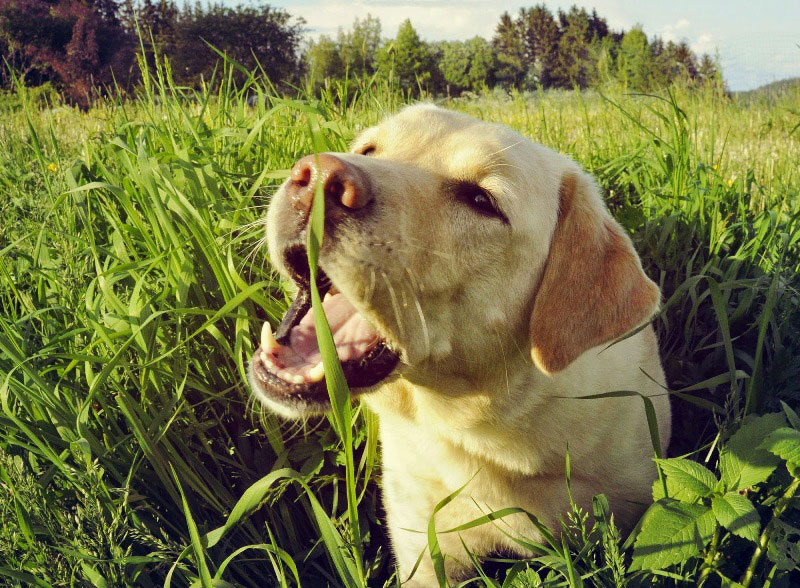
It’s springtime! Temperatures are warming, rain is plentiful, flowers are blooming, and the grass is lush and green. The pleasant weather drives many people and their pets outdoors for recreation after a long, cold winter. You might notice your dog or cat occasionally grazing on tender new blades of grass when they are outside. Some may vomit the grass, while others seem unaffected. Why do they eat grass? Although this is a common behavior for our pets, especially dogs, we actually don’t know why they eat grass. However, there are several theories.
They eat grass when they have an upset stomach to cause vomiting.
This is probably the most common belief among pet owners as to why their pets eat grass. Dogs and cats cannot digest grass, so it has no nutritional value for them. Eating grass supposedly causes irritation to the stomach, which leads to vomiting. The question is, are these pets already nauseous before eating the grass, or does the grass make them nauseous? There is not much research in veterinary literature that addresses this issue, but the few studies and surveys that have been done suggest that most pets do not vomit after eating grass. Many normal dogs and cats eat grass every day and rarely vomit. However, pets that do have some gastrointestinal disease or inflammation may be more likely to vomit after eating grass than normal pets. Have these animals “learned” that grass is an effective way to relieve stomach upset? It’s possible, but we simply don’t know.
If your dog or cat seems to eat grass and plant material excessively, it may be time for a checkup with your veterinarian, especially if this is a new, sudden behavior. If vomiting is frequent, or if there are other signs of gastrointestinal disease such as weight loss or diarrhea, then a physical exam and diagnostic testing by your vet are in order.
They eat grass because they have a dietary deficiency.
Some people wonder if their pets eat grass due to some nutrient deficiency, but there is no evidence to support this. Dogs and cats are fed a variety of types of diets, and no correlation has been found between ingestion of grass and type of diet fed. However, a pet that is excessively hungry due to a metabolic disorder may try to eat grass, dirt, or other items. If your pet’s appetite seems abnormally high, it needs to be evaluated by a veterinarian. Also, if you do happen to feed your pets a diet that is not commercially prepared (such as home cooked or raw), consult with your veterinarian regarding the proper balance of nutrients in such a diet.
They eat grass because they are stressed or anxious.
When dogs and cats experience environmental stress, they will sometimes do what is called a displacement behavior. Some external stressor, for example a scary noise or a conflict with a housemate, leads them to do an unrelated activity, such as grooming or tail chasing. This out-of-context behavior can help them cope with the stressful situation. Some animals will also develop chronic compulsive disorders due to stress, and abnormal eating behavior can fall into this category. Eating grass is not a common displacement behavior, but it is a possibility. Consider the context in which your dog or cat eats grass, and consult with your veterinarian if you are concerned that your pet has anxiety.
They eat grass because they like it!
In normal dogs and cats, the most likely explanation for eating grass is that they enjoy it. Grass may be appealing to pets as they explore and scavenge in their environment. Occasional ingestion of grass is not harmful and isn’t cause for concern. However, do not let your pet eat grass that was recently chemically treated or fertilized, as the chemicals can cause stomach upset. Also, while untreated grass is safe, many other plants are not and can be toxic to dogs and cats. It is best to prevent them from ingesting other plants in general.
Further research is needed to determine why our pets eat grass. Whether it serves some evolutionary purpose, or if they simply enjoy it, we don’t know for sure. Just remember that if you suspect a health problem, consult your veterinarian for the most trusted advice.
For more reading:
http://www.vetstreet.com/care/my-pet-wont-stop-eating-grass-whats-going-on
